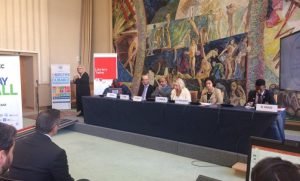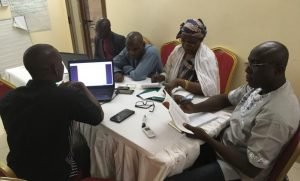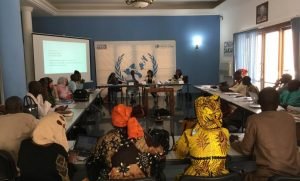On t he 30 March 2021, during the first edition of the Generation Equality Forum, Mexico chapter, the International Disability Alliance (IDA) held a Special Session with the aim to raise priorities of women with disabilities, reflecting on access to decent and safe work and employment, disability inclusive social protection and the impact of COVID-19 and the opportunity it presented to reimagine what inclusive access really means.
he 30 March 2021, during the first edition of the Generation Equality Forum, Mexico chapter, the International Disability Alliance (IDA) held a Special Session with the aim to raise priorities of women with disabilities, reflecting on access to decent and safe work and employment, disability inclusive social protection and the impact of COVID-19 and the opportunity it presented to reimagine what inclusive access really means.
The Special Session was perceived as an important event during the Generation Equality Forum as it was the only event focused on the intersectionality of gender and disability, and brought together a diverse group of stakeholders – including State representative, self-advocates and members of the CRPD Committee – and to propose a set of recommendations to governments and international cooperation stakeholders.

The Special Session brought the kind presence of:
- Her Exc. Ambassador Catalina Devandas, Permanent Mission of Costa Rica in Geneva,
- Fernanda Santana, Brazilian Association for Action on Rights of Persons with Autism (ABRAÇA), RIADIS,
- Agnes Abukito, Fellow of the World Federation of the Deafblind (WFDB)-IDA, Uganda,
- Meenakshi Balasubramanian, Center for Inclusive Policy (CIP), India,
- Amalia Gamio Ríos, Member of the CRPD Committee, Mexico,
- Valeria Gonzalez, representative of Inclusive Generation for Equality Collective, Mexico.
The event was moderatedbyTchaurea Fleury, IDA’s Director of Capacity Building.
The Her Exc. Amb. Catalina Devandas highlighted the importance of support services in the fulfilment of economic justice and why it is important to not leave behind women and girls with disabilities in the context of the COVID 19 pandemic.
“Despite efforts to bring women with disabilities to the table, we still continue to leave them out, and this is a structural issue to think about.”
Her. Exc. Catalina stated
Fernanda Santana addressed the social economic impact of exclusion of women with disabilities and emphasized the lack of inclusive education, including the access to sexual and reproductive education, in Brazil. She also highlighted the experiences of overprotection and infantilization that affects women and girls from underrepresented groups.
She further went on to link the denial of access to education for women and girls with autism in Brazil to the denial of their personal autonomy and how that in turn impacts financial independence.
“Without public policies, really focused specifically on women with disabilities, paying special attention to the most vulnerable groups, we won’t be able to deal with this kind of issue that is both about mediate an effective social protection but also a long‐term plan for a more inclusive society with equality and non-discrimination and opportunities for all, for everyone.”
Fernanda Santana
Agnes Abukito shared that the economic impact of COVID-19 was felt acutely in Uganda. Due to the lockdown, many communities could not harvest their crops, which led to increased situations of hunger and unemployment upon persons with disabilities. Persons with deafblindness in Uganda rely heavily on in person contact, and technology is very often not accessible for them. The shutting down of transportation and imposition of social distancing measures further marginalized them as, for instance, those who were in need of guide interpreters could not access the services. She also highlighted the need for Government programmes to specifically target women with disabilities from underrepresented groups.
“The procedures against the Covid 19 make an accent on social distance. But, these were not friendly to persons with deaf‐blindness, most especially women with deaf‐blindness because you have to move with a guide. And then when we talk about food distribution, in my country, Uganda, there was a policy that all people would get food at their door. It does not favor women with deaf‐blindness, because we are not among the target group that the government targeted for food distribution…”
Agnes Abukito
Meenakshi Balasubramanian presented the findings of the study “How responsive are social protection programs towards women and girls with disabilities-inferences from gender budget analysis (India)” emphasizing the lack of data disaggregated by gender and disability. She highlighted the underrepresentation of social protection schemes for women with disabilities with only 30% of schemes actually considering women with disabilities.
She also pointed out that the design of schemes and programmes end up excluding women and girls with disabilities because they do not factor in the gendered barriers to access, for instance, public work programmes exclude women as work sites do not have accessible toilets or drinking water. She concluded with the need for social audits of programmes from the lens of women with disabilities.
“The gender responsiveness and impact of multiple marginalization has to be part of the training programs of all professionals both at the government and other levels that ensures accountability, even within the disability movement. Along with the gender training mandated by the budgeting. Then there should be greater participation of women with disabilities in all forums. Re‐look at the programs and policies to ensure gender responsive design.”
Meenakshi Balasubramanian
Amalia Gamio presented the concerns of the CRPD Committee with regard to the lack of implementation of the rights of girls and women with disabilities who continue to be marginalized and discriminated against. She pointed to the upcoming General Comment on Article 27 about access to work employment being an opportunity to specifically recognize these issues and rights.
She shared that the CRPD Committee was also concerned about the profound marginalization experienced by women with psychosocial disabilities, as they are institutionalized without their consent, they have been raped, been forced to undergo abortions and forced sterilizations, that have been aggravated during the COVID-19 pandemic.
“We are looking to empower women and girls with disabilities, and that de SDGs can work in hand with the UN CRPD, so empowered women, including those with disabilities, can contribute on eradication of poverty and hunger and the achievement of the rest of the SDGs goals.”
Amalia Gamio
Valeria Guzmán presented the advocacy platform established by the Collective with the priority actions to ensure an intersectional and disability perspective in the Generation Equality Forum.
She reiterated that women and girls with disabilities have been discriminated and left behind with regard to economic justice, which has been even more pronounced during this COVID-19 crisis. She emphasized that it is crucial that women with disabilities must be actively and meaningfully participating in all decision-making fora and discussion spaces with regard to the development agenda and the recovery efforts with regard to COVID-19, and that their perspectives and the gendered barriers that they experience in accessing economic justice must be taken into account, especially from underrepresented women and girls with disabilities.
“There will not be a Equality Generation if we do not redesign the way in which we create public policies in all parts of the world, without considering all and especially those women who face the most severe structural barriers, violence, discrimination and exclusion, they do not happen in a bubble, they are filtered by all barriers… we have to open spaces so that all women can participate calmly under equal conditions… ”
Stated Her Exc. Catalina Devandas
| Main Recommendations: |
- All the different barriers faced by the women and girls with disabilities must be considered, as well as their diversity must be understood and considered in all their intersecting identities to promote their active and meaningful participation,
- We urge governments to include articles regarding women with disabilities in the general law of persons with disabilities in each country, and also to pay attention to the particular multiple and intersectional discrimination that women with disabilities face,
- Governments and other stakeholders should ensure the exercise of the rights of women and girls with disabilities on equal basis with others,
- During the COVID-19 crisis and beyond, the perspectives and the gendered barriers that women and youth women with disabilities experience in accessing economic justice must be considered and addressed, especially from underrepresented women and youth women,
- Participation in all decision-making and discussion spaces must be ensured to youth with disabilities, women with disabilities, and also, girls with disabilities, older women with disabilities, indigenous women with disabilities, and women from rural and remote areas,
- Women with disabilities, their issues and rights must be included in educational efforts, including regarding the access to sexual and reproductive education,
- The rights of women and girls, including with autism, to access to inclusive education must be ensured and promoted, as well as their right to personal autonomy, including their financial independence,
- Government and international cooperation must specifically target women with disabilities from underrepresented groups within their mainstream efforts,
- Social audits and removal of public programmes that excludes women and girls with disabilities must be factored in the gendered barriers to access, such as work sites with no accessible toilets or drinking water.





